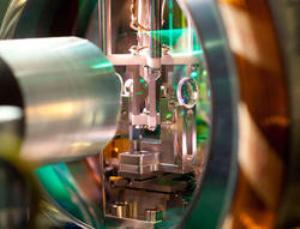The world of communication and information exchange is set to undergo major transformation with advancement in quantum technologies.

Optical Resonator (Photo Credit: C Lackner)
But this brings into focus the need for a suitable interface to connect to the quantum systems. In the current age, optical fibers are widely used to transmit enormous amount of data. Quantum networks of the future will need a mechanism to transfer information between quantum ions and photons. This should also factor in the inability of copying quantum information without getting it corrupted. Physicists have been trying to use the quantum property of entanglement to develop a quantum interface. Entanglement refers to the correlation between the values and properties of two or more objects by virtue of their past co-existence in the same physical system. Thus, if a photon and ion are entangled, the information can be transmitted from ion to photon and vice-versa.
With the concept of entanglement as a base, Rainer Blatt, Tracy Northup and Andreas Stute led research team from the Institute for Experimental Physics at University of Innsbruck, Austria, has developed a freely tunable and efficient interface. The arrangement consists of an optical resonator with two mirrors of high reflectivity. A calcium ion is placed in a trap labeled the Paul trap and is placed between the two mirrors. A laser beam is used to excite the ion which then emits a photon that entangles with the ion. This photon is reflected back and forth between the two mirrors at least 25,000 times, all the while interacting with the ion before it escapes into an optical fiber through one of the mirrors. The efficiency of entangled photon generation is very high in this method and the tuning can also be controlled by the frequency and amplitude of the laser beam. The experiment is an important step towards building the means for interaction between light and matter.
Disclaimer: The views expressed here are those of the author expressed in their private capacity and do not necessarily represent the views of AZoM.com Limited T/A AZoNetwork the owner and operator of this website. This disclaimer forms part of the Terms and conditions of use of this website.